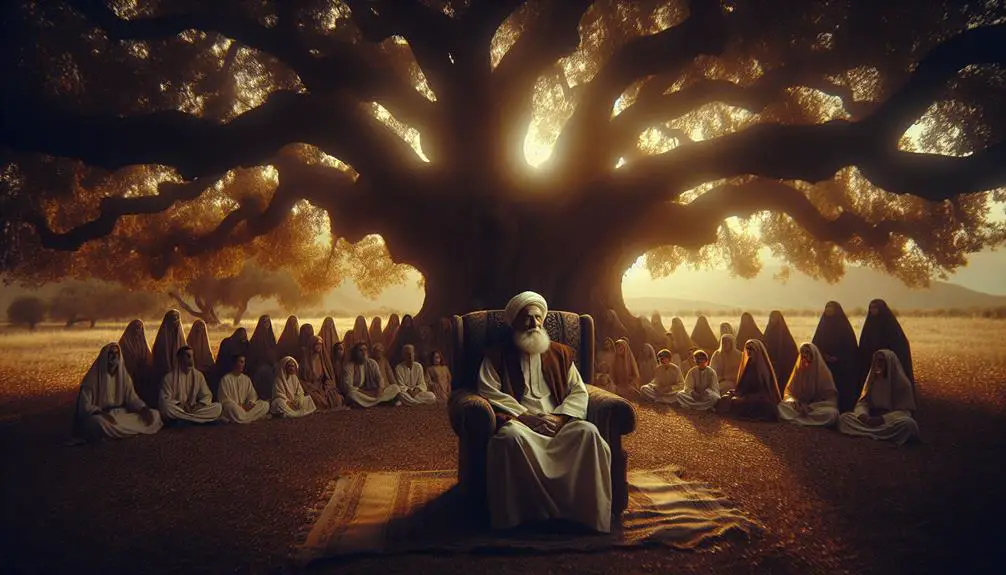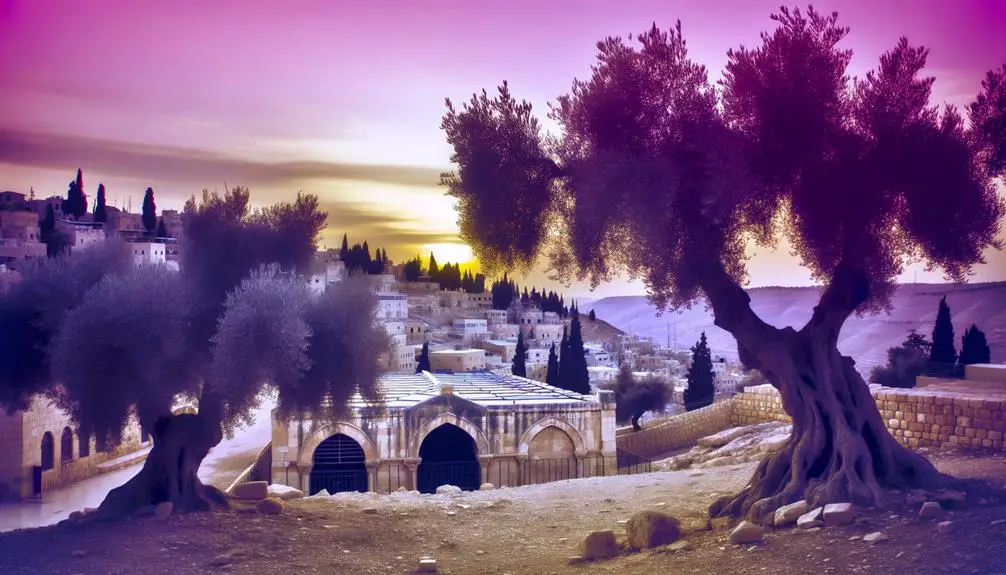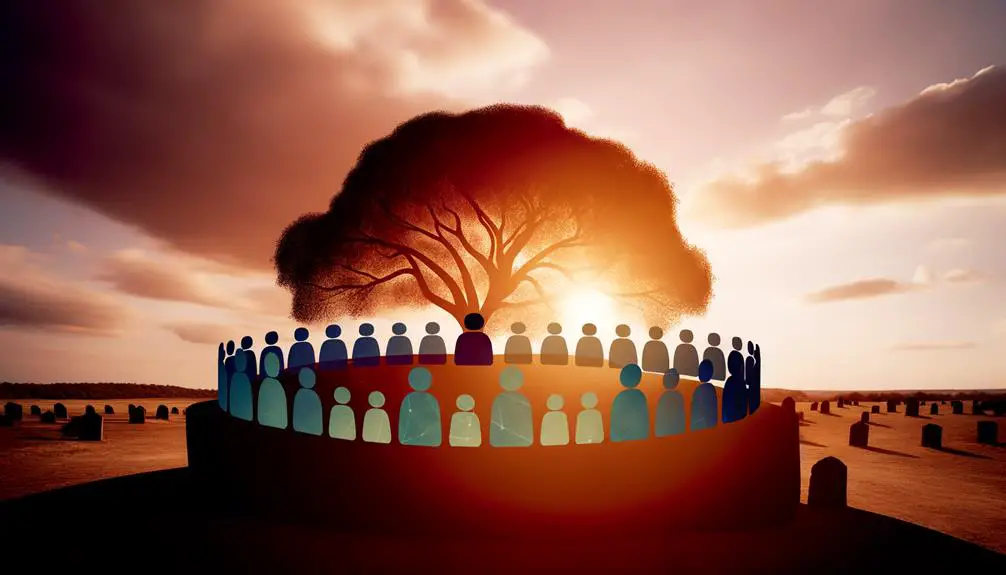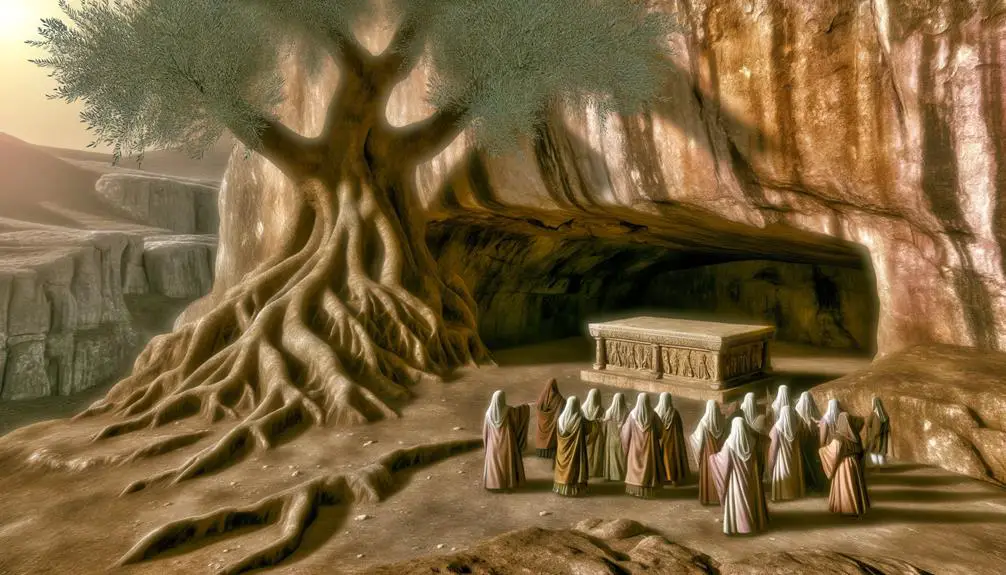This biblical narrative of Abraham's death reveals a tale of legacy, age, and final moments that beckons deeper exploration into his enduring impact.

How Did Abraham Die in the Bible
Certainly, when Abraham passed away in the Bible, it wasn't because he'd forgotten his daily dose of vitamins or missed a workout session. You've probably heard snippets of his story, how he lived to a ripe old age, surrounded by family and prosperity. The biblical account provides a serene, almost enviable departure from this world, but there's much more beneath the surface.
As you explore the nuances of his age, the significance of his death's location, and the profound legacy he left behind, you'll uncover insights that might just shift your perspective on life, legacy, and what it means to truly leave a mark.
Why not join the conversation and see where it takes you?
Key Takeaways
- Abraham died of natural causes related to old age, as indicated in the Bible.
- The scriptures focus more on Abraham's legacy than the specifics of his death.
- He lived to the age of 175, symbolizing divine favor and a blessed life.
- Abraham was buried in the Cave of Machpelah in Hebron, underscoring his spiritual significance.
The Age of Abraham

Abraham, often considered a patriarch in the biblical narrative, lived to the ripe old age of 175. This remarkable age sparks curiosity about Abraham's health and how it compares to life spans today and in historical contexts. Analyzing Abraham's longevity requires a respectful and informed approach, especially considering the vast differences between ancient and modern health standards.
In Abraham's time, the average life span was significantly shorter than what you'd expect today. Factors such as disease, limited medical knowledge, and harsh living conditions contributed to lower life expectancies. Therefore, Abraham's age of 175 stands out as extraordinary. It suggests that Abraham might've been blessed with exceptional health, possibly attributed to divine favor, which is a recurring theme in his story.
When you compare Abraham's life span to today's standards, it's clear that living past 100 is still considered remarkable, although medical advancements have made it more achievable. However, reaching 175 is unheard of, highlighting the unique nature of Abraham's age in the biblical narrative.
Analyzing Abraham's health through modern eyes also involves understanding the symbolic significance of his age. In the context of the Bible, long life is often a sign of God's blessing. Therefore, Abraham's extended life span isn't just a historical curiosity; it's a reflection of his pivotal role in the biblical story and his relationship with God.
Biblical Account of His Death

Turning to the biblical account of his demise, it's noted that Abraham passed away at a very old age, a detail that speaks volumes about his life and legacy. The scriptures, particularly in the Book of Genesis, provide a succinct account of his death, highlighting his age but leaving much to the imagination regarding the specifics of his passing. This lack of detail has led to much cause speculation, with scholars and theologians pondering over the possible health conditions that could have led to his death.
Given Abraham's advanced age, it's plausible that natural causes related to aging were the primary factor. The Bible mentions that he was 'old and full of years' (Genesis 25:8), a phrase that implies a life well-lived and a natural end. However, the absence of specific details about his health conditions has opened the door to various interpretations and theories. Some suggest that despite the lack of explicit mentions of illness, it's reasonable to infer that, like any person of such an age, Abraham might've faced age-related health challenges.
Analyzing the biblical text, it's clear that the focus isn't on the cause of Abraham's death but rather on the fulfillment of his life and the legacy he left behind. The narrative treats his passing with a profound sense of respect and solemnity, emphasizing the peaceful nature of his departure from this world. He died in a good old age, an indication of a life marked by faith, blessings, and the respect of his descendants and God.
Location of Abraham's Death

Regarding the final resting place of this patriarch, the scriptures reveal that Abraham breathed his last and was gathered to his people in Hebron, located in the land of Canaan. This location isn't just a geographical detail; it's steeped in profound historical and spiritual significance, deeply intertwined with ancestral connections that span generations.
Hebron, as a city, holds a pivotal place in the narrative of the Bible, serving as a focal point for events that shaped the destiny of Abraham's descendants. It's not merely where Abraham ended his earthly journey; it's where the covenant between him and God, promising countless descendants and this very land to his offspring, starts to manifest physically with the acquisition of a burial site – the Cave of Machpelah.
Aspect |
Significance |
Connection to Abraham |
|---|---|---|
Location |
Hebron, Canaan |
Final resting place |
Historical |
Ancient city |
Site of key events |
Spiritual |
Covenant fulfillment |
Ancestral burial site |
This table encapsulates the layers of meaning associated with Abraham's final resting place. It's not just a matter of where he was buried, but why that location mattered. Hebron's significance transcends its physicality, embodying the fulfillment of divine promises and the tangible representation of Abraham's faith and the legacy he left behind. The ancestral connections highlighted here are not just familial; they're covenantal, linking Abraham and his descendants to God's promises across generations, with Hebron serving as a symbolic anchor for these profound relationships.
Legacy and Descendants

Exploring beyond the sacred grounds of Hebron, where Abraham's physical journey concluded, his legacy unfolds through the lives and destinies of his descendants. You'll find that Abraham's impact wasn't just monumental; it was foundational to entire nations and religions. His story, as chronicled in the Bible, illustrates the covenant significance that God established with him, a covenant that promised not only land and prosperity but also a lineage as numerous as the stars in the sky.
This covenant didn't just signify a contractual agreement between the divine and the mortal; it underscored a profound faith impact that would echo through generations. Abraham's unwavering belief in God's promises set a precedent for what faith could achieve, shaping the spiritual ethos of his descendants. His sons, Isaac and Ishmael, became progenitors of the Jewish and Arab peoples, respectively, embodying the physical manifestation of Abraham's covenant with God.
Moreover, Abraham is revered as a patriarch in Christianity, Islam, and Judaism, highlighting the cross-cultural and interfaith significance of his legacy. His life's story encourages a reflection on the power of faith and the importance of fulfilling one's part in a divine promise.
As you delve into the lives of Abraham's descendants, you're not just tracing a genealogy; you're uncovering the layers of faith, promise, and divine engagement that have shaped the course of history. Abraham's legacy is a testament to the enduring impact of faith and the covenantal relationship between humanity and the divine, a theme that resonates just as powerfully today.
Burial and Final Resting Place

In the sacred narrative of Abraham's life, his burial in the Cave of Machpelah marks not just a conclusion, but a testament to his enduring legacy within the tapestry of faith. You'll find that the burial practices of Abraham's time, deeply rooted in mourning customs and the setting of grave markers, offer a rich glimpse into the cultural and spiritual milieu of the era.
The Cave of Machpelah, located in Hebron, serves as the final resting place not only for Abraham but also for other patriarchs and matriarchs of the faith, underscoring its significance. This burial site, chosen by Abraham himself, signifies a deep connection to the land and a profound belief in the continuation of his lineage within it.
Here's a brief look at the components that make Abraham's burial so significant:
Component |
Description |
Significance |
|---|---|---|
Cave of Machpelah |
Purchased by Abraham as a burial site |
Represents Abraham's faith and his connection to the Promised Land |
Mourning Customs |
Practices observed by Abraham's descendants |
Illustrate the depth of respect and remembrance |
Grave Markers |
Stones or markers set to commemorate |
Serve as enduring symbols of legacy and faith |
You'll notice that these elements not only delineate the customs of the time but also highlight the intertwined nature of faith, family, and the foresight of Abraham. His burial, observed with solemnity and respect, echoes through history, reminding you of the importance of legacy and the power of faith to transcend generations.
Frequently Asked Questions
How Do Jewish, Christian, and Islamic Traditions Differ in Their Portrayal of Abraham's Character and His Relationship With God?
In exploring Abraham's character and his divine relationship, you'll find variations across Jewish, Christian, and Islamic texts. Judaism often highlights his trials and unwavering faith, emphasizing family dynamics and his role as a patriarch.
Christianity views Abraham as a paragon of faith, underscoring his righteousness.
Islam respects him as a prophet, focusing on his submission to God's will and less on Abraham's wealth.
Each tradition offers a unique lens on his legacy.
What Are Some of the Major Tests and Trials That Abraham Faced Throughout His Life According to the Bible, and How Did They Shape His Faith?
Throughout your life, you'd face many tests and trials, just as Abraham did. His journey, marked by sacrificial faith, saw him willing to sacrifice his son, showcasing his unwavering devotion.
This act, among others, played a pivotal role in the covenant establishment between him and God. Each trial sculpted his faith, teaching him obedience, trust, and the importance of belief, ultimately shaping him into a key figure in Biblical history.
How Has Abraham's Life Influenced Modern Religious Practices and Beliefs in Judaism, Christianity, and Islam?
Abraham's life has profoundly influenced modern religious practices and beliefs across Judaism, Christianity, and Islam. His spiritual legacy is a foundation for interfaith dialogues, creating a common ground for understanding and respect among these religions.
You'll find his faith and trials woven into rituals, teachings, and moral codes, shaping not just historical narratives but also contemporary discussions on faith, ethics, and community. His story continues to inspire and guide millions today.
Are There Any Archaeological Findings or Historical Evidence That Support the Biblical Narrative of Abraham's Life and Times?
Sifting through history's sands, you'll find that archaeological evidence directly supporting Abraham's biblical narrative remains elusive. However, dating methodologies and cultural parallels offer indirect clues.
These techniques illuminate the broader canvas of ancient life, sketching a context that resonates with Abraham's era. While concrete proof is scant, the fragments pieced together through scholarly analysis provide a respectful and informed perspective on how his story might fit within the historical tapestry.
What Are the Ethical and Moral Lessons That Can Be Drawn From Abraham's Life and Decisions According to Religious Scholars and Theologians?
You can learn a lot about family dynamics and leadership qualities from Abraham's life.
Religious scholars and theologians highlight his decisions to teach about faith, obedience, and sacrifice.
His story emphasizes the importance of making tough choices for the greater good, showing resilience in adversity.
Conclusion
In the tapestry of biblical history, Abraham's passage at the ripe age of 175 weaves a significant thread, symbolizing a journey fulfilled under divine watch. His death, shrouded in peacefulness, not only marked the end of a patriarch's earthly walk but also the continuation of a legacy through Isaac and Ishmael.
Buried beside Sarah in the Cave of Machpelah, his resting place stands as a timeless monument to faith and covenant, echoing the profound impact of his life's odyssey on generations to come.



Sign up